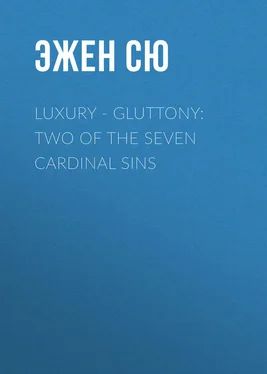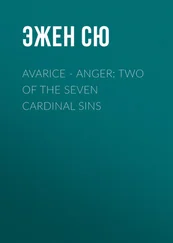Эжен Сю - Luxury - Gluttony - Two of the Seven Cardinal Sins
Здесь есть возможность читать онлайн «Эжен Сю - Luxury - Gluttony - Two of the Seven Cardinal Sins» — ознакомительный отрывок электронной книги совершенно бесплатно, а после прочтения отрывка купить полную версию. В некоторых случаях можно слушать аудио, скачать через торрент в формате fb2 и присутствует краткое содержание. Жанр: literature_19, foreign_antique, foreign_prose, на английском языке. Описание произведения, (предисловие) а так же отзывы посетителей доступны на портале библиотеки ЛибКат.
- Название:Luxury - Gluttony: Two of the Seven Cardinal Sins
- Автор:
- Жанр:
- Год:неизвестен
- ISBN:нет данных
- Рейтинг книги:4 / 5. Голосов: 1
-
Избранное:Добавить в избранное
- Отзывы:
-
Ваша оценка:
- 80
- 1
- 2
- 3
- 4
- 5
Luxury - Gluttony: Two of the Seven Cardinal Sins: краткое содержание, описание и аннотация
Предлагаем к чтению аннотацию, описание, краткое содержание или предисловие (зависит от того, что написал сам автор книги «Luxury - Gluttony: Two of the Seven Cardinal Sins»). Если вы не нашли необходимую информацию о книге — напишите в комментариях, мы постараемся отыскать её.
Luxury - Gluttony: Two of the Seven Cardinal Sins — читать онлайн ознакомительный отрывок
Ниже представлен текст книги, разбитый по страницам. Система сохранения места последней прочитанной страницы, позволяет с удобством читать онлайн бесплатно книгу «Luxury - Gluttony: Two of the Seven Cardinal Sins», без необходимости каждый раз заново искать на чём Вы остановились. Поставьте закладку, и сможете в любой момент перейти на страницу, на которой закончили чтение.
Интервал:
Закладка:
The archduke was far from expecting this refusal and this bitter retort; however, he put a good face on it, and replied, significantly:
"M. Pascal, I admire this rough sincerity; I admire this disinterestedness. Thank God, there are other means of proving to you my gratitude, and, one day, my friendship."
"Your friendship, monseigneur?"
"It is because I know its worth," added the prince, with imposing dignity, "that I assure you of my friendship, if — "
"Your friendship for me, monseigneur," replied Pascal, interrupting the prince, "your friendship for me, who have, as the wicked ones say, increased my little possessions a hundredfold by dangerous methods, although I have come out of these calumniating accusations as white as a young dove?"
"It is because you have, as you say, monsieur, come out of these odious calumnies, by which all who elevate themselves by labour and merit are pursued, that I would assure you of my affectionate gratitude, if you render me the important service I expect of you."
"Monseigneur, I could not be more impressed or more flattered by your kindness, but unfortunately business is business," said M. Pascal, "and this affair you air does not suit me at all. I need not say how much it costs me to renounce the friendship of which your Royal Highness has desired to assure me."
At this response, bitter and humiliating in its insulting irony, the prince was on the point of flying into a passion, but, reflecting upon the shame and futility of such a transport of rage, he controlled himself, and, desiring to attempt a final effort, he said, in an aggrieved tone:
"So, M. Pascal, it will be said that I prayed, supplicated, and implored you in vain."
These words, "prayed, supplicated, implored," uttered in a tone of sincere distress, appeared in the eyes of the prince to make an impression on M. Pascal, and, in fact, did make a decided impression, inasmuch as, up to that moment, the archduke had not entirely abased himself, but seeing this royal person, after such obstinate refusal, willing to descend to further supplication, M. Pascal experienced an intensity of happiness that he had never known before.
The prince, observing his silence, believed his purpose was shaken, and added, readily:
"Come, my dear M. Pascal, I cannot appeal to your generous heart in vain."
"Really, monseigneur," replied the bloodthirsty villain, who, knowing the speculation to be a good one, was at heart disposed to undertake it, but wanted to realise pleasure as well as profit from it, "you have such a way of putting things. Business, I repeat, ought to be business only, but see now, in spite of myself, I yield like a child to sentiment I am so weak — "
"You consent?" interrupted the prince, radiant with joy, and he seized both hands of the financier in his own. "You consent, my worthy and kind M. Pascal?"
"How can I resist you, monseigneur?"
"At last!" cried the archduke, drawing a long breath of profound satisfaction, as if he had just escaped a frightful danger. "At last!"
"But, monseigneur," replied Pascal, "I must make one little condition."
"Oh, I shall not stand on that, whatever it may be. I subscribe to it beforehand."
"You pledge yourself to more, perhaps, than you think, monseigneur."
"What do you mean?" asked the prince, somewhat disquieted. "What condition do you speak of?"
"In three days, monseigneur, to the hour, I will inform you."
"What!" exclaimed the prince, astonished and crestfallen; "more delays. Do you not give me your positive promise?"
"In three days, monseigneur, I will give it to you, provided you accept my condition."
"But, pray, tell me this condition now."
"Impossible, monseigneur."
"My dear M. Pascal — "
"Monseigneur," replied Pascal, with ironical gravity, "it is not my habit to be weak twice in succession during one interview. It is now the hour for my appointment in the Faubourg St. Marceau; I have the honour of presenting my respectful compliments to your Royal Highness."
M. Pascal, leaving the prince full of vexation and concern, walked to the door, then turned, and said:
"To-day is Monday; on Thursday, at eleven o'clock, I shall have the honour of seeing your Royal Highness again, and will then submit my little condition."
"Very well, monsieur; on Thursday."
M. Pascal bowed profoundly, and went out.
When he passed through the parlour where the officials were assembled all rose respectfully, recognising the importance of the person whom the prince had just received. M. Pascal returned their courtesy with a patronising inclination of the head, and left the palace as he had entered it, both hands in his pockets, not denying himself the pleasure — for this man lost nothing — of stopping a minute before the lodge of the porter and saying to him:
"Well, scoundrel, will you recognise me another time?"
"Oh, I shall recognise monsieur hereafter! I beg monsieur to pardon my mistake."
"He begs me," said Pascal, half aloud, with a bitter smile. "They know how to beg from the Royal Highness to the porter."
M. Pascal, as he went out of the Élysée, fell again into painful reflections upon the subject of the young girl whose secret meeting with Count Frantz de Neuberg he had surprised. Wishing to know if she lived in the house contiguous to the palace, he was going to make inquiries, when, remembering that such a course might perhaps compromise his plans, he prudently resolved to wait until evening.
Seeing a hackney coach, he called the driver, entered the carriage, and said to him:
"Faubourg St. Marceau, fifteen; the large factory whose chimney you see from the street."
"The factory belonging to M. Dutertre? I know, citizen, I know; everybody knows that."
The coachman drove down the street.
CHAPTER IV
M. Pascal, as we have said, had spent a part of his life in a subordinate and precarious position, enduring the most ignominious treatment with a patience full of bitterness and hatred.
Born of a peddler who had amassed a competency by dint of privation and illicit or questionable traffic, he had commenced his business career as a day-labourer in the house of a provincial usurer, to whom Pascal's father had entrusted the care of his money.
The first years of our hero were passed in a state of servitude as hard as it was humiliating. Nevertheless, as he was endowed with considerable intelligence and unusual ingenuity, and as his despotic will could, upon necessity, hide itself under an exterior of insinuating meanness, — a dissimulation which was the result of his condition, — Pascal, without the knowledge of his master, learned to read, write, and draw up accounts, the faculty for financial calculation developing in him spontaneously with marvellous rapidity. Foreseeing the value of these acquirements, he resolved to conceal them, using them only for his own advantage, and as a dangerous weapon against his master, whom he detested. After mature reflection, Pascal finally thought it his interest to reveal the knowledge he had secretly acquired. The usurer, struck with the ability of the man who was his drudge, then took him as his bookkeeper at a reduced salary, increased his meagre pay by the smallest possible amount, continued to treat him with brutal contempt, vilifying him more than ever that he might not suspect the use that he made of his new services.
Pascal, earnest, indefatigable in work, and eager to further his financial education, continued to submit passively to the outrages heaped upon him, redoubling his servility in proportion as his master redoubled disdain and cruelty.
At the end of a few years thus passed, he felt sufficiently strong to leave the province, and seek a field more worthy of his ability. He entered into a business correspondence with a banker in Paris, to whom he offered his services. The banker had long appreciated Pascal's work, accepted his proposition, and the bookkeeper left the little town, to the great regret of his former master, who tried too late to retain him in his own interests.
Читать дальшеИнтервал:
Закладка:
Похожие книги на «Luxury - Gluttony: Two of the Seven Cardinal Sins»
Представляем Вашему вниманию похожие книги на «Luxury - Gluttony: Two of the Seven Cardinal Sins» списком для выбора. Мы отобрали схожую по названию и смыслу литературу в надежде предоставить читателям больше вариантов отыскать новые, интересные, ещё непрочитанные произведения.
Обсуждение, отзывы о книге «Luxury - Gluttony: Two of the Seven Cardinal Sins» и просто собственные мнения читателей. Оставьте ваши комментарии, напишите, что Вы думаете о произведении, его смысле или главных героях. Укажите что конкретно понравилось, а что нет, и почему Вы так считаете.












